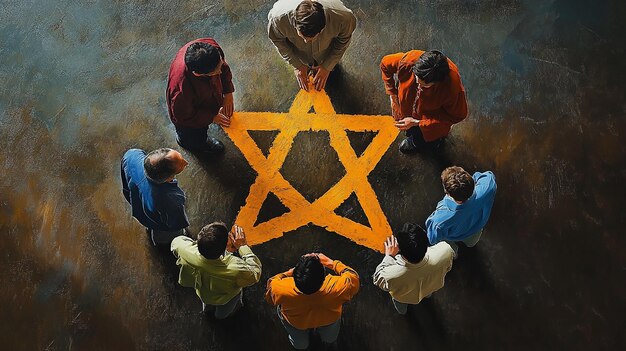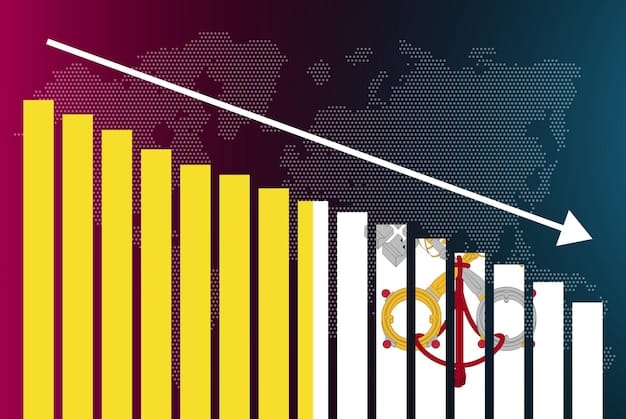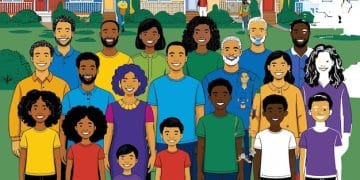US Religious Trends: How Faith Shifts Impact Social Values

Recent trends in the US show a decline in religious affiliation, influencing social values by fostering greater acceptance of diverse lifestyles, challenging traditional norms, and reshaping political landscapes.
The religious landscape in the United States is undergoing a significant transformation. Understanding the latest trends in US religious affiliation and their influence on social values is crucial for grasping the evolving dynamics of American society.
Understanding the Shifting Religious Landscape in the US
The United States has historically been a religiously diverse nation, but recent decades have witnessed substantial shifts in religious affiliation. It’s essential to understand these changes to fully appreciate their impact on social values.
These trends are not just about numbers; they reflect deeper societal changes, affecting everything from political discourse to everyday interactions.

Decline in Religious Affiliation
One of the most prominent trends is the decline in religious affiliation, particularly among younger generations. This phenomenon, often referred to as the rise of the “Nones,” has significant implications for the future of religion in America.
- Factors Behind the Decline: Several factors contribute to this trend, including increasing secularization, distrust of religious institutions, and a greater emphasis on individualism.
- Impact on Religious Institutions: Religious institutions are facing challenges in maintaining membership and relevance. This has led to changes in religious practices and outreach efforts.
- Generational Differences: Younger generations, such as Millennials and Gen Z, are less likely to identify with a specific religion compared to older generations.
The declining religious affiliation is not solely about abandoning faith, but also about redefining it. Many individuals still hold spiritual beliefs but prefer to express them outside traditional religious frameworks.
The Rise of the “Nones” and Its Social Impact
The term “Nones” refers to individuals who do not identify with any particular religion. This group has grown substantially in recent years, becoming a significant force in American society.
Their growing presence is reshaping social attitudes and political alignments, introducing new perspectives on morality, ethics, and community.
Who Are the “Nones”?
The “Nones” are a diverse group, encompassing atheists, agnostics, and those who simply do not feel connected to any specific religious tradition. Understanding their motivations and beliefs is crucial for understanding the broader societal impact.
- Demographics of the “Nones”: The “Nones” are more prevalent among younger adults, those with higher levels of education, and individuals living in urban areas.
- Beliefs and Values: While diverse, the “Nones” often prioritize reason, evidence-based decision-making, and individual autonomy.
- Influence on Social Discourse: The “Nones” are increasingly vocal in advocating for secular values and challenging religious privilege in the public sphere.
The rise of the “Nones” is not merely a statistical trend but represents a fundamental shift in how Americans view religion and its role in society. This shift has profound implications for social values and political landscapes.
Influence on Social Values: Acceptance and Tolerance
One of the most significant impacts of the changing religious landscape is the increasing acceptance and tolerance of diverse lifestyles and beliefs. This shift is particularly evident in attitudes toward LGBTQ+ rights, gender equality, and racial justice.
As religious influence wanes, secular values emphasizing inclusivity and human rights gain prominence, fostering a more tolerant society.
Evolving Attitudes Toward LGBTQ+ Rights
Attitudes toward LGBTQ+ rights have undergone a dramatic transformation in recent decades, with increasing support for same-sex marriage and LGBTQ+ inclusion. This shift is partly attributable to the declining influence of traditional religious views on sexuality and gender.
The diminishing stigma surrounding LGBTQ+ identities is fostering a more inclusive and accepting society for all.
Gender Equality and Feminism
The rise of secular feminism has also played a crucial role in promoting gender equality. Secular feminists advocate for equal rights and opportunities for women, challenging traditional gender roles often upheld by religious institutions.
The increasing emphasis on gender equality is transforming social norms and expectations, leading to a more equitable society.
The Role of Social Media and Technology
Social media and technology play a significant role in shaping religious trends and influencing social values. These platforms provide spaces for individuals to connect, share information, and challenge traditional norms.
The digital age amplifies diverse voices and perspectives, contributing to the fragmentation of religious authority and the rise of individualized belief systems.

- Online Communities: Online communities provide spaces for individuals to connect with others who share similar beliefs or values, regardless of their geographical location.
- Information Dissemination: Social media facilitates the rapid dissemination of information, allowing individuals to access diverse perspectives and challenge traditional narratives.
- Activism and Advocacy: Technology enables individuals to organize and mobilize around social and political issues, amplifying their voices and influencing public opinion.
Social media and technology are not neutral tools; they actively shape religious trends and social values by providing platforms for connection, information sharing, and advocacy. This digital transformation is reshaping the landscape of faith and its impact on society.
Political Implications: Shifting Alliances and Priorities
The changing religious landscape has significant political implications, leading to shifting alliances and changing priorities within the American electorate. Political candidates and parties must adapt to these shifts to remain relevant and competitive.
The rise of the “Nones” and the declining influence of traditional religious groups are reshaping the dynamics of political discourse and policy debates.
The Rise of the Secular Vote
The “Nones” are increasingly politically engaged, advocating for secular values and challenging religious privilege in the public sphere. Their growing political influence is forcing candidates and parties to address issues important to them.
The secular vote is becoming a significant force in American politics, demanding greater attention and representation.
The Evolving Religious Right
While the influence of traditional religious groups may be declining overall, the Religious Right remains a powerful force in American politics. However, its demographics and priorities are evolving, reflecting broader societal changes.
The Religious Right is adapting to the changing religious landscape by focusing on issues that resonate with its base, such as religious freedom and conservative social values.
Challenges and Opportunities for Religious Institutions
The changing religious landscape presents both challenges and opportunities for religious institutions. To remain relevant and thrive in the 21st century, these institutions must adapt to the needs and expectations of a diverse and evolving society.
Innovation, inclusivity, and community engagement are crucial for religious institutions seeking to maintain their relevance and attract new members.
Embracing Inclusivity and Diversity
Religious institutions that embrace inclusivity and diversity are more likely to attract and retain members in today’s society. This includes welcoming individuals from diverse backgrounds, sexual orientations, and gender identities.
Inclusivity is not just a matter of social justice but also a strategic imperative for religious institutions seeking to remain relevant and vibrant.
Focusing on Community Engagement
Religious institutions can strengthen their bonds with their communities by focusing on social service and outreach. This includes providing assistance to those in need, advocating for social justice, and promoting interfaith dialogue.
Community engagement is a powerful way for religious institutions to demonstrate their relevance and contribute to the well-being of society.
| Key Point | Brief Description |
|---|---|
| 📉 Decline in Religious Affiliation | More Americans, especially younger adults, identify as religiously unaffiliated (“Nones”). |
| 🤝 Acceptance of Diversity | Greater tolerance and support for LGBTQ+ rights, gender equality, and diverse lifestyles. |
| 📱 Tech’s Impact on Faith | Social media and online communities reshape religious practices and beliefs. |
| 🗳️Shifting Political Landscape | Secular voters are gaining influence, and the Religious Right is adapting to new social dynamics. |
Frequently Asked Questions
▼
Several factors contribute, including increasing secularization, distrust of religious institutions, a greater emphasis on individualism, and the availability of information and diverse perspectives online.
▼
Social media provides platforms for individuals to connect with like-minded people, access diverse information, and challenge traditional religious narratives. It has also led to the rise of online religious communities.
▼
The Religious Right is a conservative political movement that seeks to promote traditional religious values in the public sphere. It is evolving by focusing on issues that resonate with its base, such as religious freedom and conservative social values.
▼
Religious institutions are adapting by embracing inclusivity and diversity, focusing on community engagement, and utilizing technology to reach new audiences. They are also reevaluating their theological and ethical stances.
▼
The future of religion in the US is likely to be characterized by increasing diversity, individualization, and secularization. Religious institutions that adapt to these trends are more likely to thrive, while those that resist change may struggle.
Conclusion
The trends in US religious affiliation reveal a dynamic shift in societal values, driven by factors like secularization, technological advancements, and evolving social attitudes. These changes present both challenges and opportunities for religious institutions and impact the political and social landscapes. Understanding these trends is crucial for navigating the complexities of contemporary American culture.





